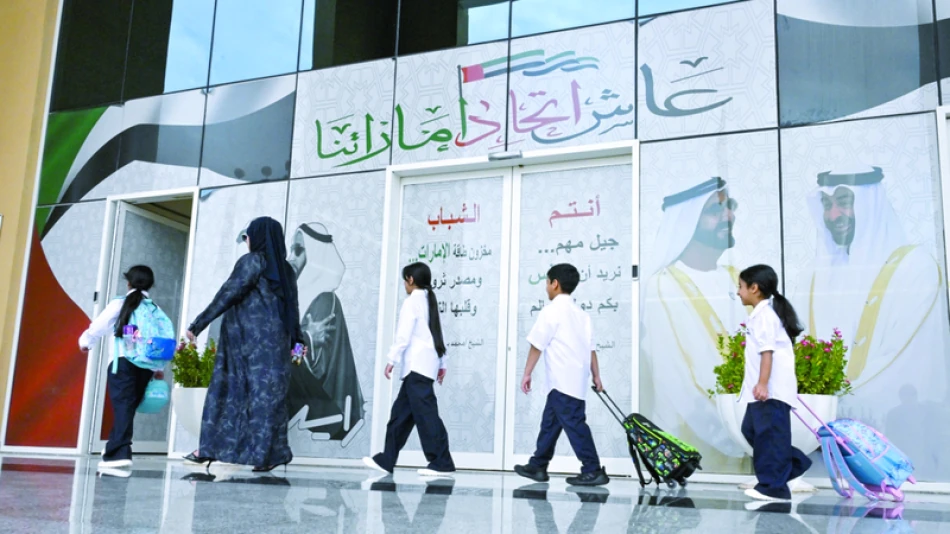
Students Smoothly Return to School with Flexible and Disciplined Schedules
UAE Schools Launch New Academic Year with AI Curriculum and Leadership-Focused Education
The United Arab Emirates has kicked off its new academic year with a strategic emphasis on artificial intelligence education and leadership development, as government and private schools welcomed students back with enhanced curricula designed to support the nation's sustainable development goals. The "From Skills to Excellence" campaign reflects the UAE's commitment to preparing future leaders in an increasingly digital economy.
Systematic Return to In-Person Learning
Public and private schools following the Ministry of Education curriculum, along with kindergartens, resumed in-person classes with students greeted by flowers and motivational messages emphasizing academic excellence. The return demonstrated both flexibility and discipline, with schools distributing class schedules and bus transportation timetables to students and parents.
Government schools received field visits from school oversight teams who assessed building conditions, maintenance, services, academic affairs, student matters, human and financial resources, security and safety procedures, readiness evaluation, staff availability, and student attendance patterns. These comprehensive inspections aimed to identify and resolve obstacles facing school administrations.
AI Integration Marks Educational Evolution
A significant development this academic year is the formal inclusion of artificial intelligence as a curriculum subject. Khalid Abdel Hamid, director of Dubai Modern Education School, confirmed that AI has been added to the class schedule, with internal teams comprising Arabic language, Islamic education, and social studies teachers overseeing implementation according to Ministry of Education guidelines.
This move positions the UAE alongside educational pioneers like Singapore and Estonia, which have successfully integrated AI literacy into their national curricula. The timing aligns with the UAE's broader AI Strategy 2031, which aims to make the country a global leader in artificial intelligence applications across multiple sectors.
Leadership Development Takes Center Stage
Saida Al Hammadi, director of Zayed Educational Complex in Al Suyouh area, explained how schools are translating the "From Skills to Excellence" campaign into enrichment programs and interactive activities. The initiative targets students from kindergarten through grade 12, focusing on developing future leaders capable of supporting the nation's sustainable development journey.
The approach emphasizes the integrated roles of educational system components, including teachers and parents, to motivate students to chart their futures according to their ambitions. This holistic strategy reflects lessons learned from successful educational models in countries like Finland and South Korea, where parent-teacher collaboration significantly impacts student outcomes.
Market Implications for EdTech Sector
The UAE's formal adoption of AI curriculum creates substantial opportunities for educational technology companies and content providers. With the global EdTech market projected to reach $377 billion by 2028, the UAE's early adoption positions it as a testing ground for AI-powered educational solutions that could be exported regionally.
Private education providers in the UAE, which serve approximately 60% of the student population, will likely accelerate their technology investments to remain competitive. This trend mirrors developments in other Gulf states, where educational innovation has become a key differentiator for premium schools.
Challenges and Adaptation Strategies
The first day saw varied attendance rates as some students remained abroad following summer holidays, highlighting the UAE's internationally mobile population. Schools plan to distribute textbooks across all educational levels during the first week, ensuring smooth academic transitions.
Strong parental presence on the first day demonstrated family commitment to educational success, with school administrations noting that family involvement provides students with reassurance and strengthens the home-school partnership from the academic year's outset.
The systematic approach to educational modernization, combined with infrastructure investments and curriculum innovation, positions the UAE's education sector as a regional benchmark. This comprehensive strategy addresses both immediate learning needs and long-term economic competitiveness, particularly as the country diversifies beyond oil dependency toward a knowledge-based economy.
Most Viewed News

 Sara Khaled
Sara Khaled






